沪教版七年级下英语教材第一单元总结
- 格式:pdf
- 大小:372.69 KB
- 文档页数:6
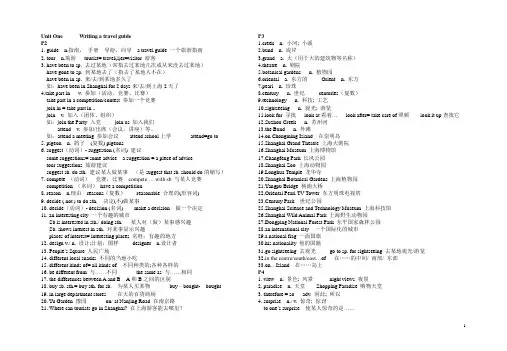
Unit One Writing a travel guideP21. guide n.指南,手册导游,向导 a travel guide 一个旅游指南2. tour n.旅游tourist= travel(l)er=visitor 游客3. have been to sp. 去过某地(常指去过某地几次或从来没去过某地)have gone to sp. 到某地去了(指去了某地人不在)have been in sp. 来/去/到某地多久了如:have been in Shanghai for 2 days来/去/到上海2天了4.take part in v. 参加(活动、竞赛、比赛)take part in a competition/contest 参加一个竞赛join in = take part in ..join v. 加入(团体、组织)如:join the Party 入党join us 加入我们attend v. 参加/出席(会议,讲座)等。
如:attend a meeting 参加会议attend school上学attend=go to5. pigeon n. 鸽子(复数) pigeons6. suggest(动词)- suggestion (名词) 建议some suggestions= some advice a suggestion = a piece of advicetour suggestions 旅游建议suggest sb. do sth. 建议某人做某事(是suggest that sb. should do的缩写)7. compete (动词)竞赛,比赛compete … with sb与某人竞赛competition (名词)have a competition8. reason n.理由reasons(复数)reasonable 合理的(形容词)9. decide ( not ) to do sth. 决定(不)做某事10. decide(动词)- decision (名词) make a decision 做一个决定11. an interesting city 一个有趣的城市Sb is interested in sth./ doing sth. 某人对(做)某事感兴趣Sb. shows interest in sth. 对某事显示兴趣places of interest= interesting places 名胜;有趣的地方12. design v./ n. 设计;计划;图样designer n.设计者13. People’s Square 人民广场14. different local snacks 不同的当地小吃15. different kinds of= all kinds of 不同种类的;各种各样的16. be different from 与……不同the same as 与……相同17. the differences between A and B A和B之间的区别18. buy sb. sth.= buy sth. for sb. 为某人买某物buy – bought- bought19. in large department stores 在大的百货商场20. Yu Garden 豫园on/ at Nanjing Road 在南京路21. Where can tourists go in Shanghai? 在上海游客能去哪里?P31.creek n. 小河; 小溪2.bund n. 堤岸3.grand a. 大(用于大的建筑物等名称)4.theatre n. 剧院5.botanical gardens n. 植物园6.oriental a. 东方的Orient n. 东方7.pearl n. 珍珠8.century n. 世纪centuries(复数)9.technology n. 科技; 工艺10.sightseeing n. 观光; 游览11.look for 寻找look at看着…look after= take care of照顾look it up查找它12.Suzhou Creek n. 苏州河13.the Bund n. 外滩14.on Chongming Island 在崇明岛15.Shanghai Grand Theatre 上海大剧院16.Shanghai Museum 上海博物馆17.Changfeng Park 长风公园18.Shanghai Zoo 上海动物园19.Longhua Temple 龙华寺20.Shanghai Botanical Gardens 上海植物园21.Yangpu Bridge 杨浦大桥22.Oriental Pearl TV Tower 东方明珠电视塔23.Century Park 世纪公园25.Shanghai Science and Technology Museum 上海科技馆26.Shanghai Wild Animal Park 上海野生动物园27.Dongping National Forest Park 东平国家森林公园28.an international city 一个国际化的城市29.a national flag 一面国旗30.his nationality 他的国籍31.go sightseeing 去观光go to sp. for sightseeing 去某地观光/游览32.in the centre/south/east…of 在……的中间/ 南部/ 东部33.on…Island 在……岛上P41. view n. 景色; 风景night views 夜景2. paradise n. 天堂Shopping Paradise 购物天堂3. therefore = so adv. 因此; 所以4. surprise n./ v. 惊奇; 惊讶to one’s surprise 使某人惊奇的是……如:to my / his surprise 使我/他惊讶的是……Sb. is surprised 某人感到惊讶Sth. is surprising 某事令人惊讶5. get on (well) with sb. = get along (well) with sb. 与某人相处融洽/得好6. get – got – got get …from…从……得到7. write (a letter) to sb. =write sb. a letter 写信给某人write – wrote – written - writing8. let sb. do 让某人做某事make sb. do sth. (迫)使某人做某事9. Would you like to do = Do you want to do…? 你想做某事吗?10.-- Would you like some…? 你想要一些……吗?--Yes , please. / No. thanks11. read – read- read read newspapers/ magazines 看报纸/ 杂志12. Shanghai is in the east of China. 上海在中国的东面。
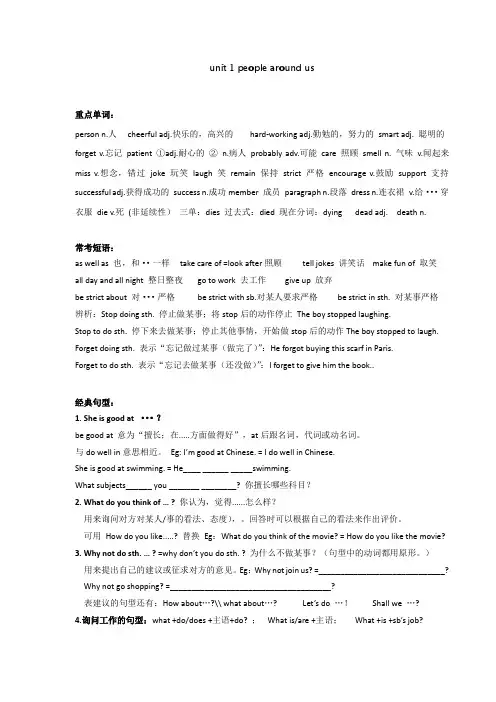
unit 1 people around us重点单词:person n.人cheerful adj.快乐的,高兴的hard-working adj.勤勉的,努力的smart adj. 聪明的forget v.忘记patient ①adj.耐心的②n.病人probably adv.可能care 照顾smell n. 气味v.闻起来miss v.想念,错过joke 玩笑laugh 笑remain 保持strict 严格encourage v.鼓励support 支持successful adj.获得成功的success n.成功member 成员paragraph n.段落dress n.连衣裙v.给···穿衣服die v.死(非延续性)三单:dies 过去式:died 现在分词:dying dead adj. death n.常考短语:as well as 也,和··一样take care of =look after照顾tell jokes 讲笑话make fun of 取笑all day and all night 整日整夜go to work 去工作give up 放弃be strict about 对···严格be strict with sb.对某人要求严格be strict in sth. 对某事严格辨析:Stop doing sth. 停止做某事;将stop后的动作停止The boy stopped laughing.Stop to do sth. 停下来去做某事;停止其他事情,开始做stop后的动作The boy stopped to laugh. Forget doing sth. 表示“忘记做过某事(做完了)”:He forgot buying this scarf in Paris.Forget to do sth. 表示“忘记去做某事(还没做)”:I forget to give him the book..经典句型:1. She is good at ···?be good at 意为“擅长;在.....方面做得好”,at后跟名词,代词或动名词。

Unit1People around us一.单词及短语。
describe v.描述———description n.描述,说明descriptive adj.描述的article n.文章relative n.亲属,亲戚complete=finish v.完成correct=right adj正确的cheerful=happy adj.高兴的smart=clever adj.聪明的probably=maybe=perhaps=possibly可能kind=type=sort n.种类Kind=friendly adj.友好的,善良的take care of=look after照顾laugh at=make fun of嘲笑smart=clever=wise adj.聪明的silly=foolish=stupid adj.愚笨的be full of=be filled with充满child=kid孩子tell sb.jokes给某人讲笑话address.n.地址v.演讲reporter n.记者interview v.采访interviewee n.受访者interviewer n.采访者conversation n.对话difficult adj--difficulty n.困难in front of=before在...前面when=while=as当....时候sometimes=at times=from time to time有时only=just仅仅can=be able to能够necessary adj.有必要的near=beside=close to=next to靠近celebrate v.庆祝celebration n.庆祝pay attention to注意go back=come back=return回来all day and all night夜以继日have breakfast=eat breakfast ill=sick生病的by oneself=alone独自have too=must必须a lot of=many/much许多gift=present礼物famous=well-known著名的from...to从....到....every=each每个special=unusual特殊的look like看起来像take off起飞put off推迟turn off关闭get off下车go off爆炸give up放弃look up查阅take up占据get up起床bring up抚养put up with忍受一.阅读1.People around you.(p1)1“people”表示“人”时,是集体名词,可理解为“人们”,词尾不能加“s”,且不能表示单个人,可以说“some people,many people”,但不可以说“a people,one people”.但是,people表示“民族”时,有单复数之分。
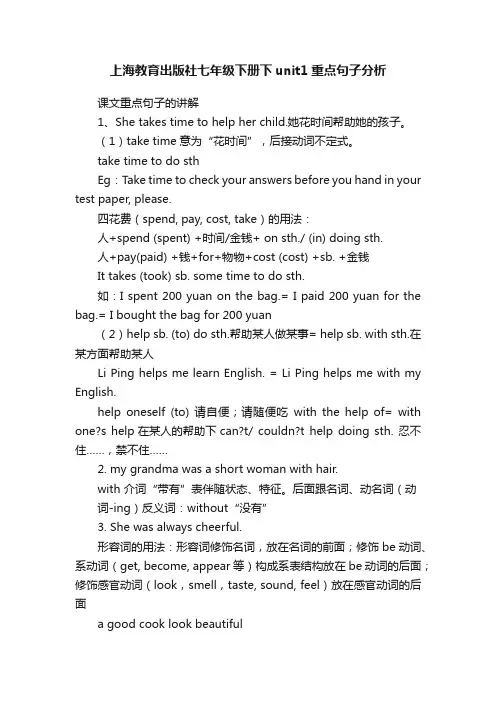
上海教育出版社七年级下册下unit1重点句子分析课文重点句子的讲解1、She takes time to help her child.她花时间帮助她的孩子。
(1)take time意为“花时间”,后接动词不定式。
take time to do sthEg:Take time to check your answers before you hand in your test paper, please.四花费(spend, pay, cost, take)的用法:人+spend (spent) +时间/金钱+ on sth./ (in) doing sth.人+pay(paid) +钱+for+物物+cost (cost) +sb. +金钱It takes (took) sb. some time to do sth.如:I spent 200 yuan on the bag.= I paid 200 yuan for the bag.= I bought the bag for 200 yuan(2)help sb. (to) do sth.帮助某人做某事= help sb. with sth.在某方面帮助某人Li Ping helps me learn English. = Li Ping helps me with my English.help oneself (to) 请自便;请随便吃with the help of= with one?s help在某人的帮助下can?t/ couldn?t help doing sth. 忍不住……,禁不住……2. my grandma was a short woman with hair.with 介词“带有”表伴随状态、特征。
后面跟名词、动名词(动词-ing)反义词:without“没有”3. She was always cheerful.形容词的用法:形容词修饰名词,放在名词的前面;修饰be动词、系动词(get, become, appear等)构成系表结构放在be动词的后面;修饰感官动词(look,smell,taste, sound, feel)放在感官动词的后面a good cook look beautiful4、I will never forget the taste, and the smell as well. 我将永远不会忘记那种味道和气味。
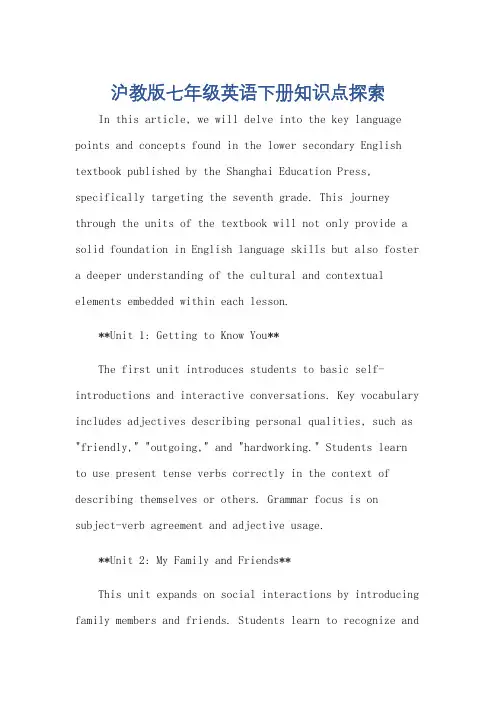
沪教版七年级英语下册知识点探索In this article, we will delve into the key language points and concepts found in the lower secondary English textbook published by the Shanghai Education Press, specifically targeting the seventh grade. This journey through the units of the textbook will not only provide a solid foundation in English language skills but also foster a deeper understanding of the cultural and contextual elements embedded within each lesson.**Unit 1: Getting to Know You**The first unit introduces students to basic self-introductions and interactive conversations. Key vocabulary includes adjectives describing personal qualities, such as "friendly," "outgoing," and "hardworking." Students learn to use present tense verbs correctly in the context of describing themselves or others. Grammar focus is on subject-verb agreement and adjective usage.**Unit 2: My Family and Friends**This unit expands on social interactions by introducing family members and friends. Students learn to recognize anduse vocabulary related to family members, such as "uncle," "aunt," and "cousin." They also practice using the present continuous tense to describe actions and activities. Additionally, they are introduced to the concept of possessive pronouns.**Unit 3: My School Life**School life becomes the focus of Unit 3, introducing vocabulary related to school subjects, activities, and schedules. Students learn to use the present simple tense to describe routines and habits. Grammar emphasis is placed on the correct use of prepositions and article changes.**Unit 4: Hobbies and Activities**Hobbies and extracurricular activities are explored in Unit 4, encouraging students to talk about their interests and preferences. New vocabulary covers a range of activities, from sports to artistic pursuits. Students practice using the future tense to express plans and intentions. This unit also introduces modal verbs to express possibility and necessity.**Unit 5: Health and Body**The topic of health and the human body is addressed in Unit 5, covering vocabulary related to physical well-being and exercise. Students learn to discuss healthy habits and routines using the present tense and adjective comparisons. Grammar focus is on using adverbs to describe manner and degree.**Unit 6: Holidays and Festivals**The final unit of the textbook delves into the world of holidays and festivals, introducing vocabulary specific to different cultural celebrations. Students learn to describe festival traditions and activities using the past tense. This unit also covers conditional sentences, allowing students to express hypothetical situations and consequences.Throughout these units, students not only acquire language skills but also gain a deeper understanding of cultural differences and the importance of communication in everyday life. The blended approach of English language learning with cultural understanding prepares students for more advanced language challenges and global interactions. **沪教版七年级英语下册知识点探索**本文将对上海教育出版社出版的七年级下册英语教材中的关键知识点和概念进行深入探讨。
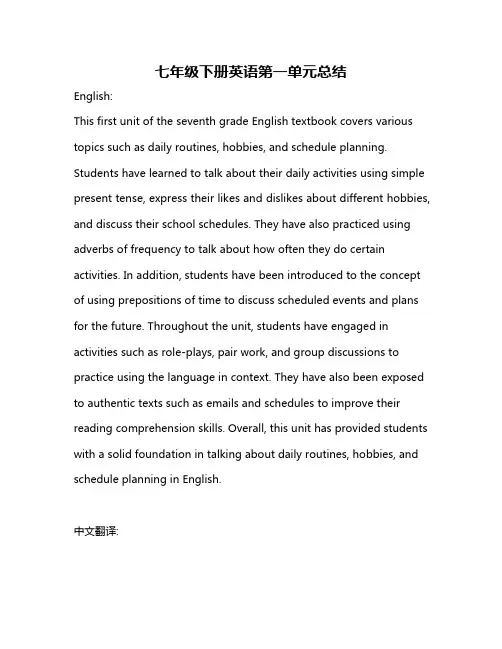
七年级下册英语第一单元总结English:This first unit of the seventh grade English textbook covers various topics such as daily routines, hobbies, and schedule planning. Students have learned to talk about their daily activities using simple present tense, express their likes and dislikes about different hobbies, and discuss their school schedules. They have also practiced using adverbs of frequency to talk about how often they do certain activities. In addition, students have been introduced to the concept of using prepositions of time to discuss scheduled events and plans for the future. Throughout the unit, students have engaged in activities such as role-plays, pair work, and group discussions to practice using the language in context. They have also been exposed to authentic texts such as emails and schedules to improve their reading comprehension skills. Overall, this unit has provided students with a solid foundation in talking about daily routines, hobbies, and schedule planning in English.中文翻译:七年级英语教科书的第一个单元涵盖了日常生活、爱好和日程安排等各种主题。
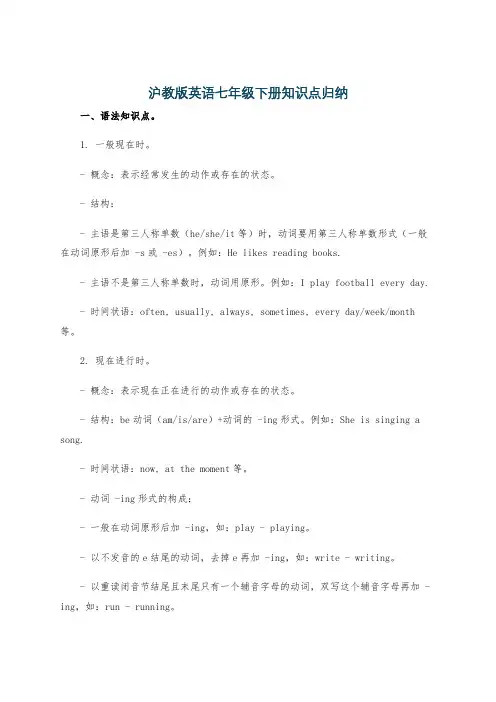
沪教版英语七年级下册知识点归纳一、语法知识点。
1. 一般现在时。
- 概念:表示经常发生的动作或存在的状态。
- 结构:- 主语是第三人称单数(he/she/it等)时,动词要用第三人称单数形式(一般在动词原形后加 -s或 -es)。
例如:He likes reading books.- 主语不是第三人称单数时,动词用原形。
例如:I play football every day.- 时间状语:often, usually, always, sometimes, every day/week/month 等。
2. 现在进行时。
- 概念:表示现在正在进行的动作或存在的状态。
- 结构:be动词(am/is/are)+动词的 -ing形式。
例如:She is singing a song.- 时间状语:now, at the moment等。
- 动词 -ing形式的构成:- 一般在动词原形后加 -ing,如:play - playing。
- 以不发音的e结尾的动词,去掉e再加 -ing,如:write - writing。
- 以重读闭音节结尾且末尾只有一个辅音字母的动词,双写这个辅音字母再加 -ing,如:run - running。
3. 形容词的比较级和最高级。
- 比较级:- 构成:- 一般在形容词原级后加 -er,如:tall - taller。
- 以e结尾的形容词,加 -r,如:nice - nicer。
- 以重读闭音节结尾且末尾只有一个辅音字母的形容词,双写这个辅音字母再加-er,如:big - bigger。
- 多音节形容词和部分双音节形容词,在原级前加more,如:beautiful - more beautiful。
- 用法:用于两者之间的比较,常用结构为“A+be+比较级+than + B”,例如:This book is more interesting than that one.- 最高级:- 构成:- 一般在形容词原级后加 -est,如:tall - tallest。
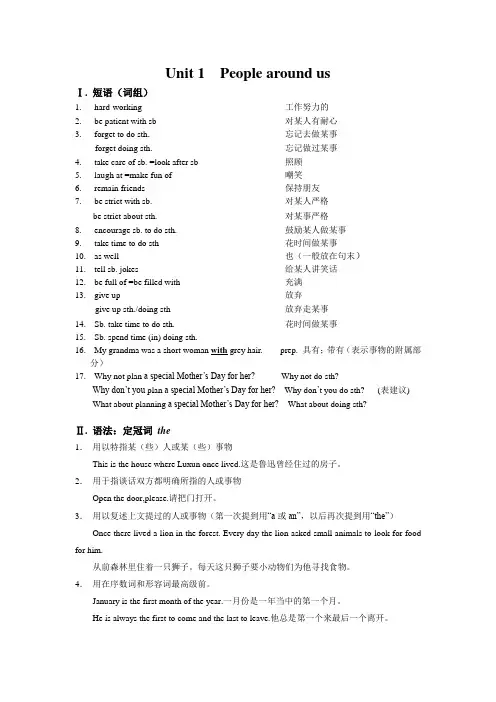
Unit 1 People around usⅠ. 短语(词组)1.hard-working 工作努力的2.be patient with sb对某人有耐心3.forget to do sth. 忘记去做某事forget doing sth. 忘记做过某事4.take care of sb. =look after sb照顾ugh at =make fun of 嘲笑6.remain friends 保持朋友7.be strict with sb. 对某人严格be strict about sth. 对某事严格8.encourage sb. to do sth. 鼓励某人做某事9.take time to do sth花时间做某事10.as well 也(一般放在句末)11.tell sb. jokes 给某人讲笑话12.be full of =be filled with充满13.give up 放弃give up sth./doing sth 放弃走某事14.Sb. take time to do sth. 花时间做某事15.Sb. spend time (in) doing sth.16.My grandma was a short woman with grey hair. prep. 具有;带有(表示事物的附属部分)17.Why not plan a special Mother’s Day for her?Why not do sth?Why don’t you plan a special Mother’s Day for her?Why don’t you do sth? (表建议) What about planning a special Mother’s Day for her?What about doing sth?Ⅱ. 语法:定冠词the1.用以特指某(些)人或某(些)事物This is the house where Luxun once lived.这是鲁迅曾经住过的房子。
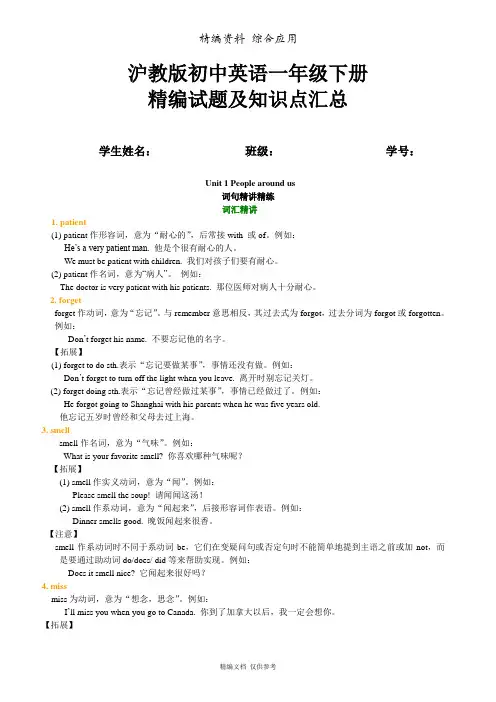
沪教版初中英语一年级下册精编试题及知识点汇总学生姓名:班级:学号:Unit 1 People around us词句精讲精练词汇精讲1. patient(1) patient作形容词,意为“耐心的”,后常接with 或of。
例如:He’s a very patient man. 他是个很有耐心的人。
We must be patient with children. 我们对孩子们要有耐心。
(2) patient作名词,意为“病人”。
例如:The doctor is very patient with his patients. 那位医师对病人十分耐心。
2. forgetforget作动词,意为“忘记”。
与remember意思相反,其过去式为forgot,过去分词为forgot或forgotten。
例如:Don’t forget his name. 不要忘记他的名字。
【拓展】(1) forget to do sth.表示“忘记要做某事”,事情还没有做。
例如:Don’t forget to turn off the light when you leave. 离开时别忘记关灯。
(2) forget doing sth.表示“忘记曾经做过某事”,事情已经做过了。
例如:He forgot going to Shanghai with his parents when he was five years old.他忘记五岁时曾经和父母去过上海。
3. smellsmell作名词,意为“气味”。
例如:What is your favorite smell? 你喜欢哪种气味呢?【拓展】(1) smell作实义动词,意为“闻”。
例如:Please smell the soup! 请闻闻这汤!(2) smell作系动词,意为“闻起来”,后接形容词作表语。
例如:Dinner smells good. 晚饭闻起来很香。
【注意】smell作系动词时不同于系动词be,它们在变疑问句或否定句时不能简单地提到主语之前或加not,而是要通过助动词do/does/ did等来帮助实现。
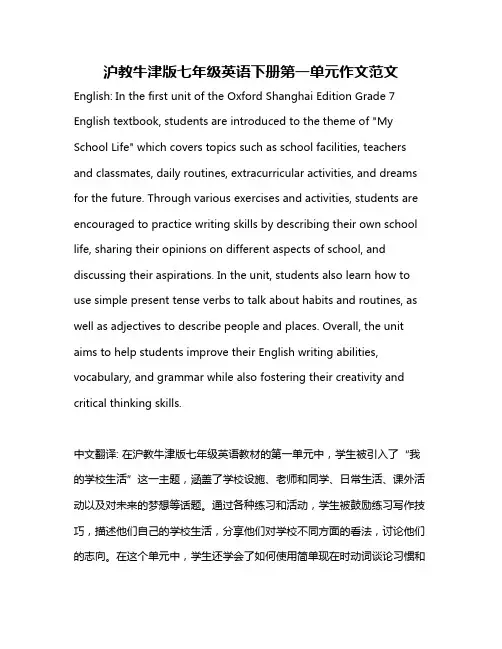
沪教牛津版七年级英语下册第一单元作文范文English: In the first unit of the Oxford Shanghai Edition Grade 7 English textbook, students are introduced to the theme of "My School Life" which covers topics such as school facilities, teachers and classmates, daily routines, extracurricular activities, and dreams for the future. Through various exercises and activities, students are encouraged to practice writing skills by describing their own school life, sharing their opinions on different aspects of school, and discussing their aspirations. In the unit, students also learn how to use simple present tense verbs to talk about habits and routines, as well as adjectives to describe people and places. Overall, the unit aims to help students improve their English writing abilities, vocabulary, and grammar while also fostering their creativity and critical thinking skills.中文翻译: 在沪教牛津版七年级英语教材的第一单元中,学生被引入了“我的学校生活”这一主题,涵盖了学校设施、老师和同学、日常生活、课外活动以及对未来的梦想等话题。
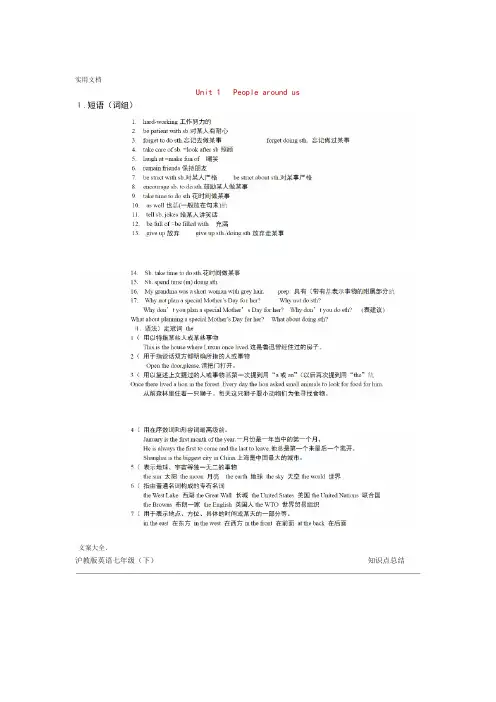
实用文档
Unit 1 People around us
Ⅰ.短语(词组)
文案大全.
沪教版英语七年级(下)知识点总结
2
知识点总结沪教版英语七年级(下)
16.
3
沪教版英语七年级(下)知识点总结
Unit 3 our animals friends
&词组短语Ⅰ.
4
沪教版英语七年级(下)知识点总结
5
沪教版英语七年级(下)知识点总结
6
沪教版英语七年级(下)知识点总结
7
沪教版英语七年级(下)知识点总结
8
沪教版英语七年级(下)知识点总结
9
沪教版英语七年级(下)知识点总结
01.
沪教版英语七年级(下)知识点总结
11.
沪教版英语七年级(下)知识点总结
Unit 7 poems
21.
沪教版英语七年级(下)知识点总结
31.
沪教版英语七年级(下)知识点总结
Ⅱ.语法 when 引导的时间状语从句。
一、
41.
沪教版英语七年级(下)知识点总结
51.。
Unit 1 People around us读:读三个学生关于他们身边人物的文章。
听:一个女孩跟地奶奶谈论她们的亲戚的事情。
语法:学会如何使用定冠词the。
说:学会部分音素的发音。
谈论你喜欢的人。
写:写一篇关于你所爱的人的短文。
A.短语归纳1.talk to sb. about sth. 跟某人谈论某事2.buy sth. for sb.(=buy sb, sth.) 为某人买物3.give sb. sth. (=give sth. to sb.) 给某人某物4.as well 除……之外;也5.take care of 照顾;照料6.two years ago 两年前7.tell jokes 讲笑话8.make fun of 取笑9.be good at=do well in 擅长10.be full of 充满,装满11.lots of 许多12.make friends with 与……交朋友13.save…from (doing) 拯救……免于……14.from…to… 从……到……15.be strict about sth. 对某事要求严格16.look like 看起来像17.go to work 上班18.all day and all night 夜以继日19.help sb. with sth. 在某方面帮助某人20.hard work 辛苦的工作21.the number of ……的数量22.first name 名23.middle name 中间名st name 姓25.say sth. to sb 跟某人说某事.26.in the world 在世界上27.study hard 努力学习28.play table tennis 打乒乓球29.give sb. support 给某人支持30.write down 写下31.look after 照顾32.give sb. a lot of hope 给某人很多希望33.in the sky 在空中st night 昨天晚上35. a visit to ……之旅36.play a computer game 玩电脑游戏37.play the guitar 弹吉他38.play basketball 打篮球39.the man in the purple suit 穿紫色西装的人40.have to 不得不41.every weekend 每个周末42.take sb. to… 带某人去……B.句型归纳1.It takes time to do sth. 花费时间做某事2.make sb. do sth. 让某人做某事3.give up doing sth. 放弃做某事4.keep doing sth. 一直/反复做某事5.stop doing sth. 停止做某事6.would like to do sth. 想要做某事7.try to do sth. 尽力做某事8.why not do sth.? 为什么不做某事呢9.advise sb, to do sth. 建议某人做某事10.spend… doing sth. 花费……做某事11.what do you think of…? 你认为/觉得……怎么样?12.like doing/to do sth. 喜欢做某事13.buy sth. for sb. 为某人买某物14.make sth. for sb. 为某人制作某物15.help sb. do sth. 帮助某人做某事C.语法定冠词the1.特指某个/某些人或物2.指双方都知道的人或物3.指上文提到过的人或物4.用在有普通名词构成的专有名词前5.用在姓氏复数前,表示一家人或夫妇二人6.在动词play后表示乐器的名词连用7.用在表示独一无二的事物的名词前8.用于某些形容词前表示一类人9.用在形容词最高级前10.用在序数词以及表示序列的形容词11.用在方位名词前12.用在一些固定词组中Unit 2 Travelling around the world读:读一篇关于在法国旅行的文章听:听有关对埃菲尔铁塔的介绍。
牛津沪教版英语七年级下期末重点知识复习总结牛津沪教版英语七年级下期末重点知识复总结七年级下期末重点知识复Unit 1 Lesson 1 XXX1.短语梳理1.all the time = always - continuously。
without ping2.een…and… - in the middle of two things3.go to…for summer/winter holidays - XXX4.for sightseeing/fun - XXX5.go sightseeing - visit tourist ns6.Why not +动词原形?=Why don’t you +动词原形?=What/How about +动名词?- suggesting an activity7.the highest temperature - the maximum temperature。
the lowest temperature - the minimum temperature句型:1.What’s the weather like today/the re/in Beijing。
---It’s hot。
= How is the weather…。
- asking about the weather2.What’s the temperature…。
---It’s…… - asking about the temperature3.It is a good time to do sth。
= It is a good time for sth。
- indicating a good time to do something4.---Where have/has…been for…。
---…have/has been to…- asking XXX5.---Where have/has…gone for…。
七下英语沪教版第一单元范文(English Response)。
Part 1: Reading Comprehension.1. Who is the protagonist of the story?The protagonist of the story is a young boy named David.2. What does David find in the forest?David finds a magical key in the forest.3. Where does the key lead to?The key leads to a secret garden.4. Who helps David explore the secret garden?A friendly robin helps David explore the secret garden.5. What does David discover in the secret garden?David discovers a beautiful garden filled with flowers, birds, and a friendly robin.Part 2: Vocabulary.1. Define the word "key."A key is a small metal object used to operate a lock.2. Define the word "garden."A garden is an area of land where flowers, fruits,or vegetables are grown.3. Define the word "robin."A robin is a small, migratory songbird with areddish-orange breast and a black back.Part 3: Grammar.1. Identify the part of speech for the word "the."The word "the" is an article.2. Identify the part of speech for the word "secret."The word "secret" is an adjective.3. Identify the part of speech for the word "helped."The word "helped" is a verb.Part 4: Writing.Write a short paragraph describing your favorite place to visit.My favorite place to visit is the beach. I love thefeeling of the sand between my toes and the sound of the waves crashing against the shore. I can spend hours playing in the sand, building castles, and swimming in the ocean. The beach is a place where I can relax and escape from the hustle and bustle of everyday life.(Chinese Response)。
沪教牛津七下英语知识点总结咱就说这沪教牛津七下英语知识点啊,那可真是像一锅大杂烩,啥都有。
我一瞅那课本,就感觉像进了个迷宫似的。
先说那单词吧,有些单词长得那叫一个奇怪。
就像“alien”这个词,我第一次见的时候,眼睛都瞪大了。
我就想啊,这词儿怎么长得跟外星人似的,歪歪扭扭的。
我当时还跟同桌嘟囔呢,我说:“你看这‘alien’,感觉像个小怪物的名字。
”同桌就笑我,说:“你可真逗,这就是外星人的意思。
”你说这巧不巧,还真让他说对了。
这单词啊,不仅要会写,还得知道它那些个用法。
像它可以做名词,说有外星人来了,就是“An alien comes.”这用法就跟咱中文里,一个词儿在不同句子里有不同身份似的。
再说说语法。
语法这东西啊,就像一把双刃剑。
有时候能帮你把句子说得顺顺当当的,可有时候又把你弄得晕头转向。
就拿一般现在时来说吧。
我总是在想,啥时候用第三人称单数加“s”呢?我经常在那纠结。
有一回,我写句子,“He like apples.”写完我还美滋滋的,觉得肯定没错。
结果老师一看,眼睛一瞪,说:“你这like后面咋不加‘s’呢?”我当时脸就红了,就像个熟透的苹果。
我心里想,这语法咋就这么难搞呢?后来我就自己在那琢磨,把那些规则写在小纸条上,贴在桌子上,天天看。
慢慢地,我就有点开窍了。
还有那课文里的对话。
那可真是有趣得很。
有些对话就像是在演小短剧一样。
我就想象着那些人物的样子,他们的神态。
就说那篇讲在餐厅点餐的课文吧。
我就感觉那服务员站得笔直,脸上带着微笑,客客气气地问顾客:“What would you like to order?”那顾客呢,就挠挠头,看着菜单,想了半天说:“I'd like a hamburger and a glass of juice.”我每次读这个对话的时候,就感觉自己好像就在那个餐厅里似的,周围都是饭菜的香味,人来人往的,可热闹了。
我还会跟我朋友模拟这个对话,我当服务员的时候,就故意把声音提高,装得很热情,朋友就被我逗得哈哈大笑。